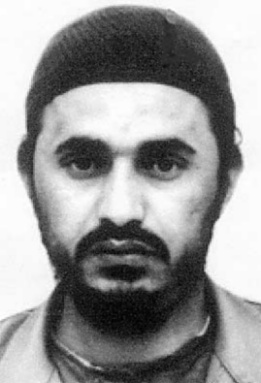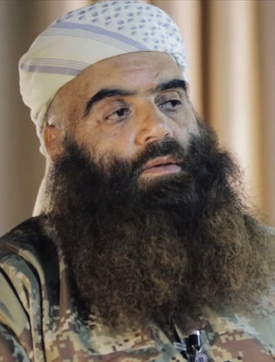Related Research Articles
The FBI Most Wanted Terrorists is a list created and first released on October 10, 2001, with the authority of United States President George W. Bush, following the September 11 attacks (9/11 incident). Initially, the list contained 22 of the top suspected terrorists chosen by the FBI, all of whom had earlier been indicted for acts of terrorism between 1985 and 1998. None of the 22 had been captured by US or other authorities by that date. Of the 22, only Osama Bin Laden was by then already listed on the FBI Ten Most Wanted Fugitives list.

Ansar al-Islam in Kurdistan, simply called Ansar al-Islam, is a Kurdish Islamist militant and separatist group. It was established in northern Iraq around the Kurdistan Region by Kurdish Islamists who were former Taliban and former Al-Qaeda volunteers, which were coming back from Afghanistan in 2001 after the Fall of Kabul. Its motive is to establish an Islamic state around the Kurdistan region and to protect Kurdish people from other armed insurgent groups. It imposed strict Sharia in villages it controlled around Byara near the Iranian border.

Abdullah Ahmed Abdullah was a high-ranking Egyptian member of al-Qaeda. He has been described as al-Qaeda's most experienced operational planner and was said to be the second-in-command in the organization at the time of his death.

Jama'at al-Tawhid wal-Jihad, abbreviated as JTJ or Jama'at, was a Salafi jihadist militant group. It was founded in Jordan in 1999, and was led by Jordanian national Abu Musab al-Zarqawi for the entirety of its existence. During the Iraqi insurgency (2003–11), the group became a decentralized network with foreign fighters with a considerable Iraqi membership.

The 2005 Amman bombings were a series of coordinated suicide bomb attacks on three hotel lobbies in Amman, Jordan, on 9 November 2005. The explosions at the Grand Hyatt Hotel, the Radisson SAS Hotel, and the Days Inn started at around 20:50 local time at the Grand Hyatt. The three hotels are frequented by foreign diplomats. The bomb at the Radisson SAS exploded in the Philadelphia Ballroom, where a Palestinian wedding hosting hundreds of guests was taking place. The attacks killed 57 people and injured 115 others.

Abu Ayyub al-Masri, also known as Abu Hamza al-Muhajir, born Abdel Moneim Ezz El-Din Ali Al-Badawi, was the leader of Al-Qaeda in Iraq during the Iraqi insurgency, following the death of Abu Musab al-Zarqawi in June 2006. He was war minister of the Islamic State of Iraq from 2006 to 2010 and prime minister of the Islamic State of Iraq from 2009 to 2010. He was killed during a raid on his safehouse on 18 April 2010.

Abu Musab al-Zarqawi, born Ahmad Fadeel al-Nazal al-Khalayleh, was a Jordanian jihadist who ran a terrorist training camp in Afghanistan. He became known after going to Iraq and being responsible for a series of bombings, beheadings, and attacks during the Iraq War, reportedly "turning an insurgency against US troops" in Iraq "into a Shia–Sunni civil war". He was sometimes known by his supporters as the "Sheikh of the slaughterers".
Hassan Ghul, born Mustafa Hajji Muhammad Khan, was a Saudi-born Pakistani member of al-Qaeda who revealed the kunya of Osama bin Laden's messenger, which eventually led to Operation Neptune Spear and the death of Osama Bin Laden. Ghul was an ethnic Pashtun whose family was from Waziristan. He was designated by the Al-Qaida and Taliban Sanctions Committee of the Security Council in 2012.

Tanzim Qaidat al-Jihad fi Bilad al-Rafidayn, more commonly known as Al-Qaeda in Iraq, was a Salafi jihadist organization affiliated with Al-Qaeda. It was founded on 17 October 2004, and was led by Abu Musab al-Zarqawi and Abu Ayyub al-Masri until its disbandment on 15 October 2006.

It is believed that members of Al-Qaeda are hiding along the border of Afghanistan and northwest sections of Pakistan. In Iraq, elements loosely associated with al-Qaeda, in the Jama'at al-Tawhid wal-Jihad organization commanded by Abu Musab al-Zarqawi, have played a key role in the War in Iraq.
Abu Ghadiya was an al-Qaeda in Iraq (AQI) militant and smuggler. The United States Treasury Department claimed his real name was Badran Turki Hishan al-Mazidi and that he was born sometime between 1977–1979 in Mosul. However, other reports claimed that Abu Ghadiya was born in Damascus in 1976 and his real name was Sulayman Khalid Darwish. He graduated from the Damascus University Dentistry School sometime during the 1990s, until he later went to Afghanistan and joined al-Qaeda. He was primarily involved in the logistics of AQI's effort in Iraq and assisted in smuggling weapons, money and fighters across the Iraq–Syria border. The US claimed he was targeted and killed, in a cross-border raid conducted by the U.S. military and possibly the Syrian government as well on October 26, 2008. However, an al-Qaeda in Iraq obituary released in August 2006 says that Abu Ghadiya was killed by the Saudi-Iraqi border sometime in November 2004. The Syrian government protested the raid claiming, that it killed eight civilians. Journalists who reached the attack site reported claims by local people who said that the victims of the raid were all innocent civilians.

The Islamic State of Iraq was a Salafi jihadist militant organization that fought the forces of the U.S.-led coalition during the Iraqi insurgency. The organization aimed to overthrow the Iraqi federal government and establish an Islamic state governed by Sharia law in Iraq.

Jund al-Aqsa, later known as Liwa al-Aqsa after 7 February 2017, was a Salafist jihadist organization that was active during the Syrian Civil War. Formerly known as Sarayat al-Quds, the group was founded by Abu Abdul 'Aziz al-Qatari as a subunit within the al-Nusra Front. The group later became independent, because al-Nusra was growing too rapidly for its resources and had suffered from fighting the Islamic State of Iraq and the Levant. On 20 September 2016 the U.S. Department of State designated Jund al-Aqsa as a terrorist organization. The group rejoined al-Nusra Front, by then renamed Jabhat Fateh al-Sham (JFS), in October 2016. However, on 23 January 2017, JFS declared that Jund Al-Aqsa was no longer part of Jabhat Fateh Al-Sham. In early February 2017, some of Jund al-Aqsa's units joined the newly formed Tahrir al-Sham, while the others refused and formed a new splinter group called Liwa al-Aqsa, and captured many towns in northern Hama and southern Idlib from other rebel groups. Following these attacks, Tahrir al-Sham launched a military operation against Liwa al-Aqsa, accusing them of being an ISIL affiliate. Following intense clashes with Tahrir al-Sham, up to 2,100 Liwa al-Aqsa militants left Idlib Province to join ISIL in Raqqa Province, by 22 February 2017.

Radwan Nammous, also known by his nom de guerre Abu Firas al-Suri, was a senior official in al-Qaeda's Syrian affiliate al-Nusra Front, serving as the group's spokesman.

Samir Hijazi, known as Abu Humam al-Shami or Faruq al-Suri, is a Syrian militant and soldier who was the military chief of al-Qaeda's Syrian affiliate al-Nusra Front. He became the head of the Guardians of Religion Organization in February 2018, though he was replaced by Khalid al-Aruri.
Abdullah Abd al-Rahman Muhammad Rajab Abd al-Rahman, known as Ahmad Hasan Abu al-Khayr al-Masri, was an Egyptian al-Qaeda leader who has been described as the general deputy to al-Qaeda leader Ayman al-Zawahiri.
Khalid Mustafa Khalifa al-Aruri, known as Abu al-Qassam, was a Palestinian-Jordanian Islamic militant and a member of al-Qaeda who was the leader of the Guardians of Religion Organization.
Muhammad Yusuf Uthman Abd al Salam (2014–1956) was the founder of Jund al-Aqsa, a Salafist jihadist group active in the Syrian Civil War. He is also commonly referred to by his nom de guerre Abu Abdulaziz al-Qatari. He was a Jordanian citizen of Palestinian origin who lived in Qatar.

Tanzim Hurras al-Din also known as Al-Qaeda in Syria, is a Salafi Jihadist organization fighting in the Syrian Civil War. The group's head, Abu Humam al-Shami was the general military commander of the defunct al-Nusra Front, and had fought for Al-Qaeda in 1990s Afghan civil war and the Iraqi insurgency. Hurras al-Din was established by the leaders of the AQ-affiliated Khorasan group and Al-Qaeda loyalists of Al-Nusra Front who opposed Jabhat Fatah al-Sham 's dissolution and merger with other Islamic groups to form Tahrir al-Sham. Abu Humam Al-Shami announced the formation of Hurras al-Din on 27 February 2018.
The origins of the Islamic State group can be traced back to three main organizations. Earliest of these was the "Jamāʻat al-Tawḥīd wa-al-Jihād" organization, founded by the Jihadist leader Abu Mus'ab al-Zarqawi in Jordan in 1999. The other two predecessor organizations emerged during the Iraqi insurgency against the U.S. occupation forces. These included the "Jaish al-Ta'ifa al-Mansurah" group founded by Abu Omar al-Baghdadi in 2004 and the "Jaysh Ahl al-Sunnah wa’l-Jama’ah" group founded by Abu Bakr al-Baghdadi and his associates in the same year.
References
- ↑ Jean Charles Brisard and Damien Martinez, Zarqawi: The New Face of Al Qaeda (Cambridge 2005) p 136
- ↑ "Iran Released Top Members of Al Qaeda in a Trade". New York Times. 17 September 2015.
- ↑ "Al Qa'ida's External Operations Unit is back". 19 September 2015. Retrieved 27 May 2016.
- ↑ "Terror Fears As Iran Frees Al Qaeda Members". Sky News. 14 September 2015.
- ↑ "Al Qaeda veteran reportedly killed in Idlib | FDD's Long War Journal". 22 August 2019.